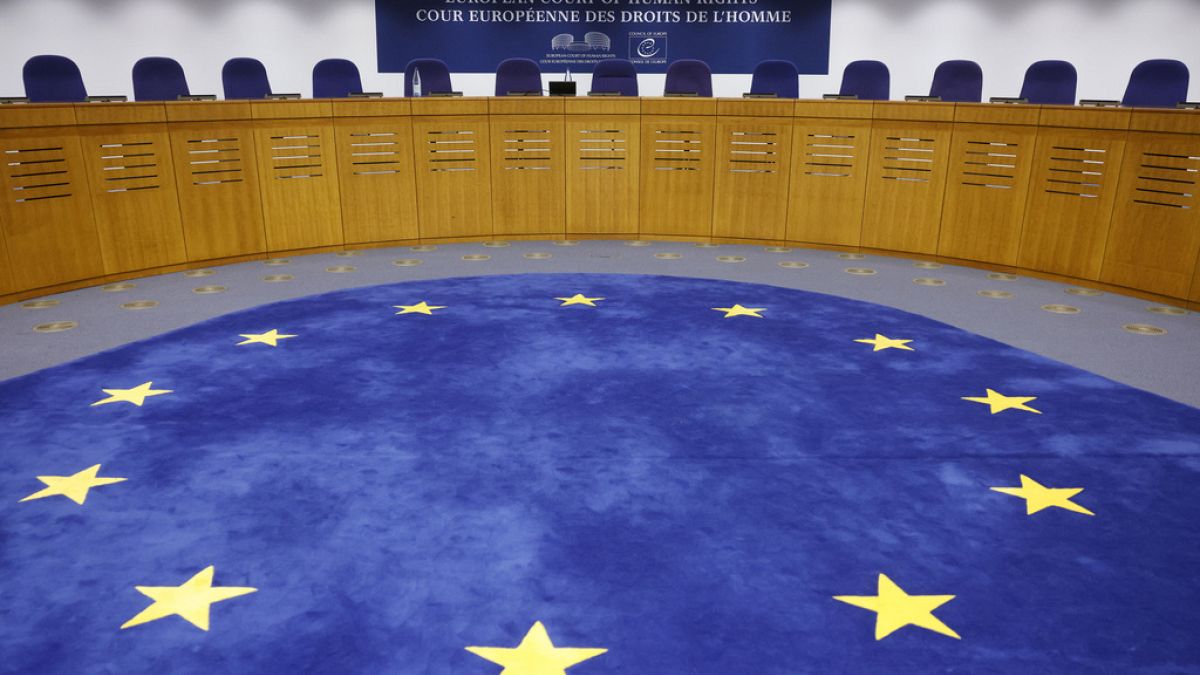Threats to leave the European Convention on Human Rights are once again circulating in the UK, as the right-wing Conservative Party elects its new leader. How true are the candidates’ claims that the convention hinders efforts to control migration?
The British right-wing opposition Conservative Party is in the process of electing its new leader, and a seemingly familiar argument has reared its head: should the UK leave or remain in Europe?
This time, the debate has nothing to do with the EU. Instead, Tory leadership hopeful Robert Jenrick has vowed to immediately withdraw from the European Convention on Human Rights (ECHR) if he ever becomes prime minister.
The reason, he says, is because the convention is an obstacle to controlling immigration, allowing migrants to apply to the European Court of Human Rights (ECtHR) in Strasbourg to challenge their removal from the UK.
While she’s fallen short of making any promises, Kemi Badenoch, Jenrick’s rival in the leadership race, has also said that she would be willing to leave the ECHR if necessary to cut immigration.
These pledges have sent a wave of concern through moderates in the party. But would exiting the ECHR and its parent organisation, the Council of Europe, actually make any difference?
It’s not just the ECHR that protects asylum seekers
While there is some credibility to the claim that the ECtHR is blocking the UK from deporting migrants, it’s not entirely true for two main reasons.
The first is that the court can only step in under very specific circumstances. As a bastion of human rights, the ECtHR can prevent deportations if the asylum seeker in question faces a real risk of torture or degrading treatment in the country they would be sent to, in violation of Article Three of the ECHR.
“The European Court of Human Rights can block deportations only in cases where there is evidence that a person can suffer very serious harm by being returned to a third country,” Ilias Trispiotis, professor of human rights law at the University of Leeds, told EuroVerify.
“The second reason, and perhaps even more important reason why that claim is false, is that the legal principle of non-refoulement is not just based on the ECHR,” he added. “It is a core principle of international law.”
The non-refoulement principle forbids countries from deporting people to a country which could threaten their life or freedom based on things like their race, religion or nationality.
It’s a key component not just of the ECHR, but of other international agreements including the UN’s 1951 Refugee Convention, the International Covenant on Civil and Political Rights, and the UN Convention Against Torture.
“Even if the UK decided to withdraw from the ECHR, state authorities would still not be able to deport any migrants they want to third countries because of other international law, treaties and obligations outside the ECHR,” Trispiotis said.
The same would be true even if the UK decided to leave the ECHR and adopt a British Bill of Rights, an idea championed by the previous Conservative government.
“It wouldn’t have actually made much difference in relation to this particular point,” said Gavin Phillipson, professor of public law and human rights at the University of Bristol. “And whatever bill of rights you have only deals with your domestic situation.”
“If you really wanted to give yourself a completely free hand internationally, you’d have to withdraw not only from the ECHR but also from the Refugee Convention and the United Nations Convention Against Torture, which I can’t realistically see us doing,” he said.
It’s also worth pointing out that the ECHR only places some constraints on how countries treat refugees or asylum seekers. As Phillipson pointed out, the convention has no effect at all on how countries handle legal migration, which accounts for the overwhelming majority of migration figures.
“That’s all done on the basis of government policy about visas and work grounds and has nothing whatsoever to do with the European Convention on Human Rights,” he explained.
Brexit redux
The vast majority of European countries are part of the Council of Europe and therefore signatories to the ECHR, meaning it’s certainly not just the UK that sometimes has to deal with ECtHR deportation judgments that don’t go its way.
Russia and Belarus are the only countries that sit fully outside the Council of Europe, the former having been expelled in March due to its full-scale invasion of Ukraine. The Vatican City is an observer state, while Kosovo is in the final stages of accession.
Nevertheless, the issue of ECHR membership appears to be particularly toxic in the UK, likely due to the persistence of Euroscepticism on the right eight years after the Brexit referendum.
This is despite polls that show growing “Brexit regret” among the British electorate — and the fact that the Council of Europe and the ECtHR by extension have nothing to do with the EU.
“This is a characteristic example of propaganda directed at the court,” Dimitrios Giannopoulos, inaugural chair in law at Goldsmiths, University of London, told EuroVerify. “The demonising of the court is a reflection of the Eurosceptic movement. It’s a blatant example that we are reliving the Brexit psychodrama.”
“We have left the EU, but in the mind of many of those who took part in the referendum, we should have left the European Court of Human Rights at the same time, because the European Court of Human Rights in Strasbourg was attacked as a proxy for the EU for a very long time,” he added.
“We’ve left the EU, and now the European Court of Human Rights is attacked in a very direct way.”
The ECHR issue is also a talking point in the UK because of the previous Conservative government’s failed plans to deport asylum seekers to Rwanda for processing, which it claimed were frustrated by the ECtHR.
The new Labour government has scrapped the Rwanda plan, labelling it a “gimmick”.
Leave or remain?
Experts resoundingly agree that the benefits of remaining with the ECHR far outweigh those of withdrawing.
“It would be a devastating blow to the UK’s reputation within Europe and beyond as a country that accepted basic human rights obligations,” Phillipson said. “It would also cause major difficulties with the EU in relation to our Brexit deal with them, which implicitly requires us to continue to abide by the ECHR.”
He added that it would cause problems concerning the Good Friday Agreement between the UK and Ireland, which ended most of the violence of the Troubles in Northern Ireland and which has the ECHR specifically embedded into its text.
Some recall that the UK was a founding member of the Council of Europe and has always been at the centre of the ECHR, rather than positioning it as an opposing foreign body that exerts its will over sovereign states.
“The UK has played a prominent role historically in the conceptualisation and then shaping up of the European Convention on Human Rights,” Giannopoulos said. “It all started with Churchill and the other European partners.”
“And then the UK not only became one of the countries that helped develop the law of the European Convention on Human Rights, it is now one of the best pupils, if you like, in the system of the Council of Europe that relates to the ECHR,” he continued.
The UK’s legal system works harmoniously with the ECtHR, not against it: British courts are “in constant dialogue” with Strasbourg, according to Giannopoulos, with the Supreme Court in particular being “prestigious and robust enough” to raise its voice and contradict European judgments that don’t make sense in its eyes.
“The right-wing narrative is taking attention away from ensuring the smooth coexistence of the two,” he said.
Ultimately, the ECHR has had a profoundly positive effect on human rights protection in the UK, according to Trispiotis.
“Thanks to ECtHR judgments, the police cannot stop and search people without reason; the state cannot retain the DNA of innocent people indefinitely; key press freedoms are protected; people can serve in the UK army regardless of their sexual orientation; corporal punishment in schools is unlawful.”
“And those are just some among the many examples of the ECHR strengthening the protection of human rights in the UK, especially for some of the most vulnerable,” Trispiotis continued. “Leaving the ECHR would be a historic mistake.”



